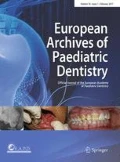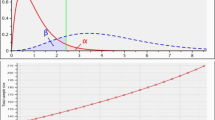Abstract
Aim
To investigate the knowledge of preschool teachers of early childhood oral health (OH) and its association with demographic and educational characteristics as well as with personal oral health habits and attitudes.
Methods
Teachers (594) of preschool children were invited to complete a questionnaire with 40 questions on demographic data, knowledge of early childhood OH issues, personal OH habits and attitudes, and participation in OH educational programmes at preschools. Statistical analysis included descriptive statistics, Spearman correlation coefficients, multiple linear and logistic regression modelling (p ≤ 0.05).
Results
The mean age of participants was 40.9 years (SD 7.5), 68.5% of them had children of their own, 72.6% had not attended any OH educational course during their studies, 70% believed that they had insufficient knowledge to implement an OH educational programme, 44.6% had implemented such a programme, 26.8% knew that the first dental visit should be at a child’s first birthday and 36.7% knew the correct age that tooth brushing should start. The most significant factors that influenced overall teachers’ knowledge on early childhood oral health were: their participation in OH educational programmes (p < 0.001), their belief that OH courses during their studies were necessary (p = 0.01), their confidence on OH knowledge (p = 0.03) and parenthood (p = 0.05).
Conclusions
Based on the results of this study, there was a lack of knowledge among preschool teachers in significant OH issues for that age. Moreover, limitations in implementing OH educational programmes at preschools were attributed mainly to lack of self-confidence in relevant knowledge. Nevertheless, participants acknowledged the significance of OH and were willing to participate in relevant teacher training.
Similar content being viewed by others
References
Αgouropoulos A. Record of oral health of preschool children in the prefecture of Attica and effectiveness of the implementation of a two-year caries-preventive program. PhD Thesis, Athens; 2012.
Agouropoulos A, Twetman S, Pandis N, Kavvadia K, Papagiannoulis L. Caries-preventive effectiveness of fluoride varnish as adjunct to oral health promotion and supervised tooth brushing in preschool children: a double-blind randomized controlled trial. J Dent. 2014;42(10):1277–83.
Aljafari AK, Scambler S, Gallagher JE. Hosey MT Parental views on delivering preventive advice to children referred for treatment of dental caries under general anaesthesia: a qualitative investigation. Community Dent Health. 2014;31(2):75–9.
Alsada LH, Sigal MJ, Limeback H, Fiege J, Kulkarni GV. Development and testing of an audio-visual aid for improving infant oral health through primary caregiver education. J Can Dent Assoc. 2005;71(4):241a–241h.
Al-Tamimi S, Petersen PE. Oral health situation of schoolchildren, mothers and schoolteachers in Saudi Arabia. Int Dent J. 1998;48:180–6.
Anderson M, Dahllöf G, Twetman S, et al. Effectiveness of early preventive intervention with semiannual fluoride varnish application in toddlers living in high-risk areas: a stratified cluster-randomized controlled trial. Caries Res. 2016;50(1):17–23.
Barros A, Moreira L, Santos H, et al. “Cancer–Educate to Prevent”–high-school teachers, the new promoters of cancer prevention education campaigns. PLoS One. 2014;9(5):e96672. doi:10.1371/journal.pone.0096672.
Begzati A, Meqa K, Siegenthaler D, Berisha M, Mautsch W. Dental health evaluation of children in Κosovo. Eur J Dent. 2011;5(1):32–9.
Bowling Α. Mode of questionnaire administration can have serious effects on data quality. J Public Health. 2005;27(3):281–91.
Cole M, Cole S. The development of children and journey through childhood development VID 2-Pk & Stud Observation Wbk. Published December 15th 2000 by Worth Publishers.
Del Greco L, Walop W. Questionnaire development: 5. The pretest. CMAJ. 1987;136:1025–6.
Fernando S, Kanthi RD, Johnson NW. Preschool teachers as agents of oral health promotion: an intervention study in Sri Lanka. Community Dent Health. 2013;30(3):173–7.
Fisher-Owens SA, Gansky SA, Platt LJ, et al. Influences on children’s oral health: a conceptual model. Pediatrics. 2007;120(3):e510–20.
Fleming P. Timetable for oral prevention in childhood-a current opinion. Prog Orthod. 2015;16:27 (AAPD REFERENCE MANUAL V 37/NO 6 15/16).
Frazier PJ, Johnson BG, Jenny J. Health educational aspects of preventive dental programs for school-aged children in 34 countries—final results of an FDI international survey. Int Dent J. 1983;33:152–70.
Gill P, Chestnutt IG, Channing D. Opportunities and challenges to promoting oral health in primary schools. Community Dent Health. 2009;26(3):188–92.
Glasrud P, Frazier J. Future elementary schoolteachers’ knowledge and opinions about oral health and community programs. Public Health Dent. 1988;48(2):74–80.
http://www.statistics.gr/el/statistics/-/publication/SED11/, Access on 3/2016.
Kagihara LE, Niederhauser VP, Stark M. Assessment, management, and prevention of early childhood caries. J Am Acad Nurse Pract. 2009;21(1):1–10.
Kay EJ, Locker D. Is dental health education effective? A systematic review of current evidence. Community Dent Oral Epidemiol. 1996;24(4):231–5.
Kierce EA, Boyd LD, Rainchuso L, Palmer CA, Rothman A. Association between early childhood caries, feeding practices and an established dental home. J Dent Hyg. 2016;90(1):18–27.
Kranz AM, Rozier RG, Zeldin LP, Preisser JS. Oral health activities of early head start teachers directed toward children and parents. J Public Health Dent. 2011;71(2):161–9.
Leger LH. The opportunities and effectiveness of the health promoting primary school in improving child health—a review of the claims and evidence. Health Educ Res. 1999;14(1):51–69.
Mamai-Homata E, Polychronopoulou A, Topitsoglou V, Oulis C, Athanassouli T. Periodontal diseases in Greek adults between 1985 and 2005—risk indicators. Int Dent J. 2010;60(4):293–9.
Mathu-Muju KR, Lee JY, Zeldin LP, Rozier RG. Opinions of Early Head Start staff about the provision of preventive dental services by primary medical care providers. J Public Health Dent. 2008;68(3):154–62.
Mayer AB, Smith BJ, McDermott RJ. Health education: always approved but still not always on schools’ radar. Am J Health Educ. 2011;42(6):349359. doi:10.1080/19325037.2011.10599206.
Mofidi M, Zeldin LP, Rozier RG. Oral health of early head start children: a qualitative study of staff, parents, and pregnant women. Am J Public Health. 2009;99(2):245–51. doi:10.2105/AJPH.2008.133827 Epub 2008 Dec 4.
Nyandindi U, Milen A, Palin-Palokas T. Impact of oral health education on primary school children in Tanzania. Health Promot Int. 1996;11:193–201.
O’Mullane D, Parnell C. Early childhood caries: a complex problem requiring a complex intervention. Community Dent Health. 2011;28(4):254.
Oulis CJ, Tsinidou K, Vadiakas G, et al. Caries prevalence of 5, 12 and 15-year-old Greek children: a national pathfinder survey. Community Dent Health. 2012;29(1):29–32.
Pinkham JR. Pediatric dentistry: infancy through adolescence, 4th edn. St. Louis, MO: Elsevier Saunders; 2005.
Seman K, Yaacob H, Hamid AM, Ismail AR, Yusoff A. Evaluation of a training programme for non-health professionals as oral health educators. Malays J Med Sci. 2008;15(2):33–8.
Sisson KL. Theoretical explanations for social inequalities in oral health. Community Dent Oral Epidemiol. 2007;35(2):81–8.
Stephens S. Teachers as dental health educators. Odontostomatol Trop. 1984;7:205–8.
Stone DH. Design a questionnaire. Br Med J. 1993;307:1264–6.
Twetman S, Dhar V. Evidence of effectiveness of current therapies to prevent and treat Early Childhood Caries. Pediatr Dent. 2015;37(3):246–53.
USA Department of Health and Human Services, “Oral health in America,” A Report of the Surgeon General, 2000. http://www.surgeongeneral.gov/library/reports/oralhealth/. Accessed Feb 2015.
van Loveren C, Duggal MS. Experts’ opinions on the role of diet in caries prevention. Caries Res. 2004;38(Suppl 1):16–23.
Watt RG. From victim blaming to upstream action: tackling the social determinants of oral health inequalities. Community Dent Oral Epidemiol. 2007;35:1–11.
Wierzbicka M, Petersen PE, Szatko F, Dybizbanska E, Kalo I. Changing oral health status and oral health behaviour of school children in Poland. Community Dent Health. 2002;19(4):243–50.
Acknowledgements
The authors would like to thank the Municipal Preschool Authority of the City of Athens and all the teachers that participated in the study. This project was funded by the “Live.Learn.Laugh” project by FDI/Unilever and supported by the Hellenic Dental Association.
Author information
Authors and Affiliations
Corresponding author
Ethics declarations
This project was funded by the “Live.Learn.Laugh” project by FDI/Unilever and supported by the Hellenic Dental Association.
All the authors declare that they have no conflict of interest.
This study involved human participants that had received informed consent for this project.
Ethical approval
All procedures performed in studies involving human participants were in accordance with the ethical standards of the institutional and/or national research committee and with the 1964 Helsinki declaration and its later amendments or comparable ethical standards.
Rights and permissions
About this article
Cite this article
Liontou, V., Agouropoulos, A., Gizani, S. et al. Knowledge of preschool teachers in the prefecture of Attica of early childhood oral health. Association with their demographic and personal characteristics. Eur Arch Paediatr Dent 17, 467–474 (2016). https://doi.org/10.1007/s40368-016-0255-7
Received:
Accepted:
Published:
Issue Date:
DOI: https://doi.org/10.1007/s40368-016-0255-7




